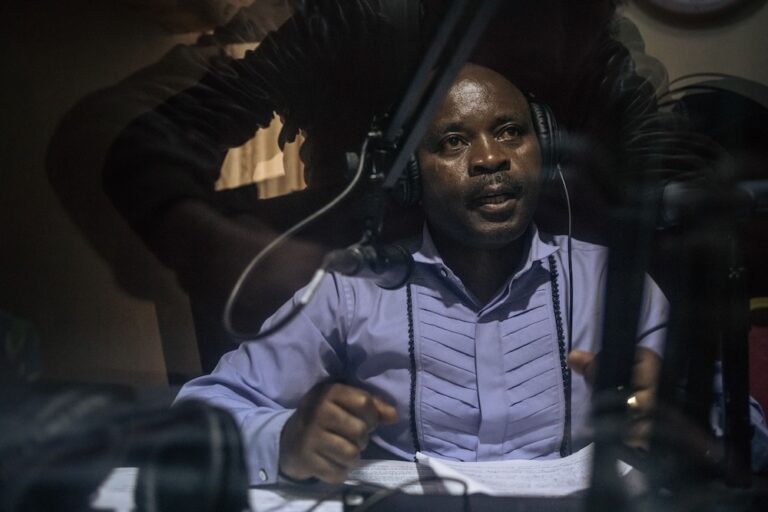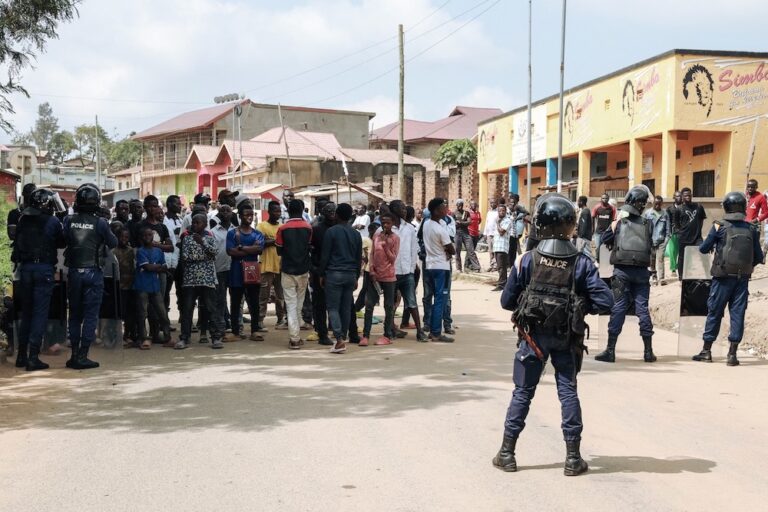(JED/IFEX) – According to a press release that was read on the air on 8 July 2003 at 7:00 a.m. (local time) on RTNC/Bukavu, a Congolese National Radio-television provincial radio station controlled by the Congolese Rally for Democracy (Rassemblement congolais pour la démocratie, RCD/Goma), on 7 July, Jean-Pierre Lola Kisanga, the official in charge of […]
(JED/IFEX) – According to a press release that was read on the air on 8 July 2003 at 7:00 a.m. (local time) on RTNC/Bukavu, a Congolese National Radio-television provincial radio station controlled by the Congolese Rally for Democracy (Rassemblement congolais pour la démocratie, RCD/Goma), on 7 July, Jean-Pierre Lola Kisanga, the official in charge of the former rebel group’s Communications Department, signed an order allowing Radio Maendeleo, a community radio station based in Bukavu, in South Kivu province, to resume its broadcasts. The station had been banned for over six months.
The press release specified that Radio Maendeleo was authorised to resume its operations, but “in another format, since station directors, having recognised their errors, changed the set of instructions that define the contents of their programmes.” Justifying their decision, RCD/Goma officials said, “On the eve of the country’s reunification, is is time to support the democratisation process and to promote press freedom in the Democratic Republic of Congo.”
Radio Maendeleo director Kizito Mushizi Nfundiko told JED that he heard the news of the decision while listening to RTNC/Bukavu radio, but had not yet received official notification of the move. Nfundiko said Radio Maendeleo was in a position to resume its broadcasts within 24 hours, but added that he had neither negotiated nor agreed to any specific preconditions with RCD/Goma officials allowing for the resumption of his station’s operations.
JED welcomes the former rebel group’s decision, but rejects any preconditions that may violate the spirit and the letter of Articles 27, 28 and 29 of the Democratic Republic of Congo’s constitution, as agreed to by all the actors in the Congolese crisis and signed into law on 4 April. These articles guarantee freedom of expression and freedom of opinion, as well as the right to inform and to be informed (see IFEX alert of 9 April 2003).
BACKGROUND:
On 9 December 2002, at around 1:20 p.m., RCD intelligence services agents, accompanied by police officers, closed the offices of Radio Maendeleo.
All of the radio station’s employees and visitors to the station’s library and Internet room were rounded up and forced onto a waiting bus. The detainees were all released a few minutes later, with the exception of Nfundiko and news director Omba Kamembele, who were held for 48 hours.
RCD/Goma officials were offended by information broadcast by Radio Maendeleo on 7 and 8 December. The radio station had aired a programme in which local residents of Bukavu had criticised the RCD/Goma’s decision to introduce new vehicle licence plates in areas under its control. The move was cancelled following local protests over the issue.
Launched in 1993, Radio Maendeleo was previously closed by the RCD/Goma from 21 July 1999 to 8 August 2001 (see alerts of 7 August 2001, 16 October 2000, 7 September and 29 July 1999).


